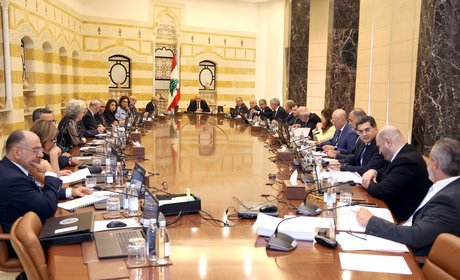Shiite ministers walk out as cabinet tasks army with drafting plan to restrict arms before Aug. 31

Lebanon's government on Tuesday tasked the army with developing a plan to restrict arms to the state by year end, Prime Minister Nawaf Salam said, an unprecedented move that paves the way for disarming Hezbollah.
The government "tasked the Lebanese Army with setting an implementation plan to restrict weapons" to the army and other government forces "before the end of this year," with the plan to be presented to the cabinet by the end of this month, Salam told a press conference after a nearly six-hour cabinet session headed by President Joseph Aoun.
Environment Minister Tamara al-Zein of the Amal Movement and Health Minister Rakan Nassereddine of Hezbollah had walked out of the cabinet session shortly before its end in protest at its decisions.
State Minister for Administrative Development Fadi Makki meanwhile voiced reservations over the part related to setting a timetable before the army presents its proposal and before the continuation of discussions in the presence of all parties in the next cabinet session.
Finance Minister Yassine Jaber of the Amal Movement and Labor Minister Mohammad Haidar of Hezbollah did not attend the session due to their presence outside the country.
Salam also announced that Cabinet would discuss the latest U.S. paper in its session on Thursday.
The Iran-backed Hezbollah emerged badly weakened from more than a year of hostilities with Israel, including two months of all-out war that saw its arsenal pummelled and a slew of senior commanders killed, among them leader Sayyed Hassan Nasrallah.
Long the strongest political force in Lebanon -- with detractors accusing it of using the threat of its weaponry to impose its will on domestic decisions -- Hezbollah has also seen that influence diminish since the conflict.
Hezbollah chief Sheikh Naim Qassem, in a televised address while the cabinet meeting was underway, said the Iran-backed group would not disarm while Israeli attacks continue.
"Any timetable presented for implementation under... Israeli aggression cannot be agreed to," he said.
Israel has kept up regular raids on Lebanon despite the November truce, mostly saying it is striking Hezbollah targets, and has threatened to keep doing so until the group has been disarmed.
Qassem also criticized a recent proposal presented by U.S. envoy Tom Barrack on disarming the group.
Hezbollah is the only faction that kept its weapons after Lebanon's 1975-1990 civil war, doing so in the name of "resistance" against Israel, which occupied the country's south until 2000.
Last month, Barrack urged Lebanon to "act now" to impose a state weapons monopoly.
A Lebanese official with knowledge of the talks told AFP that "Washington is pressuring Lebanon to make Hezbollah hand over its weapons according to a timetable, but without (the U.S.) providing any guarantees."
The group will not surrender its weapons "without something in return -- the Americans know this well," the official added, speaking on condition of anonymity.
Aoun last week said Lebanon was committed to removing "weapons from all armed groups including Hezbollah" and seeing them surrendered to the Lebanese Army.
Lebanon is at "a crucial stage" and must choose "between collapse and stability," Aoun had said, linking international support for the crisis-hit country to disarming the group.
Before discussing the fate of its weapons, which it considers a matter of domestic defense strategy, Hezbollah has demanded that reconstruction of areas destroyed during the war begin, and that Israel stop its attacks, withdraw from five areas it occupies and release Lebanese prisoners.
But analysts say Hezbollah's options for pressing its demands are more limited since the conflict.
According to David Wood from the International Crisis Group, Hezbollah could apply pressure to the government by saying "that the (disarmament) decision doesn't represent Lebanon's national interests."
It could also encourage its supporters to demonstrate, but any violent escalation "that Hezbollah's leadership deliberately plans and calls for is still a pretty unlikely scenario," he said, noting a domestic confrontation was "not in Hezbollah's interest."
However, with the government pushing for disarmament and Hezbollah demanding concessions first, Wood said a diplomatic track could run into an impasse.
Qassam forgets that he is negotiating as-if a citizen of Lebanon with the government of Lebanon, and that he is not a representative of a country that is negotiating with other countries (i.e., SATAN and satan) on the terms of disengagement. He might want to be the Grand Ayatollah of Iran, but for now, he doesn't have international standing to speak or negotiate with other countries. No, he is just another Iranian on the television scolding citizens of other countries on how they are disrespecting the citizens and government of the once great Persian empire ... that and 2 Million Rial will get you a cup of coffee in Dahieh.



